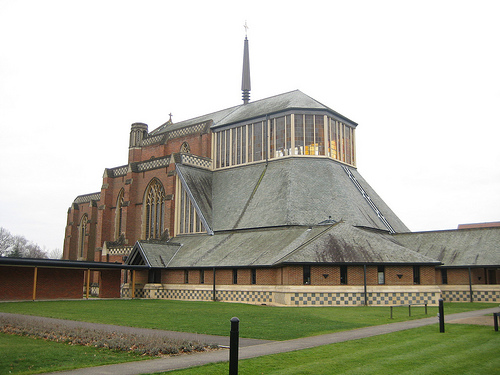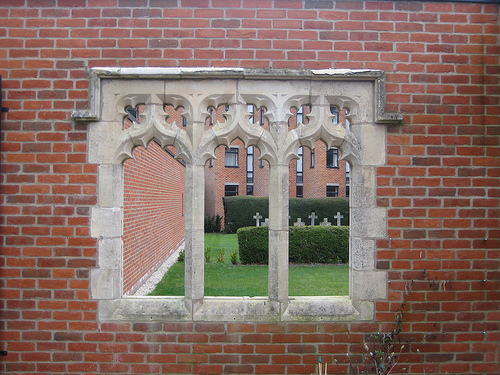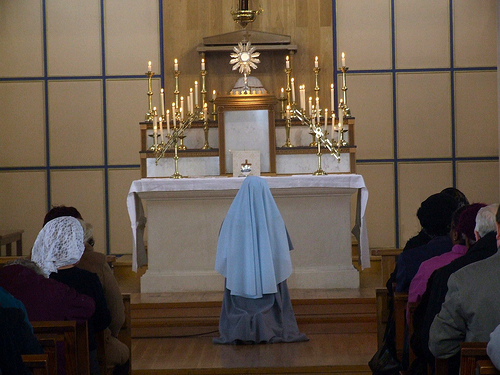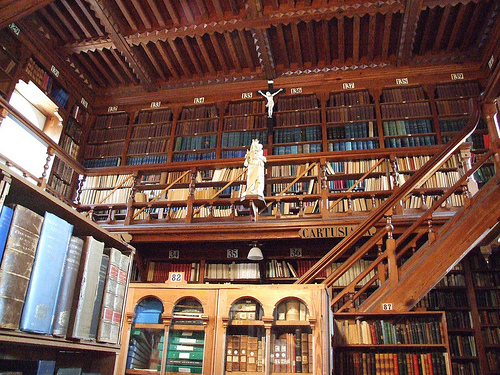For the first time since the reign of Mary Tudor, the traditional Latin Mass was celebrated at York Minster last Saturday. About 800 people attended the Mass celebrated in honour of St Margaret Clitherow. Afterwards, there was a procession through the streets of York, including The Shambles where the Saint lived, across the Ouse and on to the English Martyrs' Church.
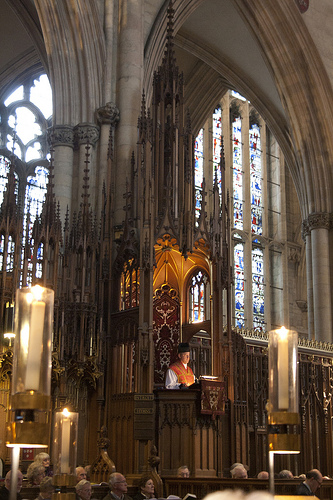 The Mass was organised by the Latin Mass Society and you can read more about the occasion at the LMS blog. The celebrant was Fr Stephen Maughan (left); his sermon is also available. The singers were the indomitable Rudgate Singers, sometimes now referred to as the Rudgate Ramblers after Mike Forbester's blog. In addition to the proper texts of the Mass, they sang the Byrd five part Mass. I hear that the rendering was sublime.
The Mass was organised by the Latin Mass Society and you can read more about the occasion at the LMS blog. The celebrant was Fr Stephen Maughan (left); his sermon is also available. The singers were the indomitable Rudgate Singers, sometimes now referred to as the Rudgate Ramblers after Mike Forbester's blog. In addition to the proper texts of the Mass, they sang the Byrd five part Mass. I hear that the rendering was sublime. LMS chairman Joseph Shaw has his own report and a fine flickr set of photos (from which those posted here are taken.) James Preece was there (right) and has written enthusiastically about the day, as has Fr Michael Brown at Forest Murmurs. Fr Brown notes that "looking around the parish newsletters of the York [Catholic] parishes on the internet none of them mentioned the event." (Though in fact two parishes in York did advertise it locally.) The occasion was, of course, widely covered by TV, radio and local press; one of my parishioners who travelled to attend the Mass brought back the newsletter from York Minster which also mentioned it, billing it straightforwardly as "Roman Catholic Mass."
LMS chairman Joseph Shaw has his own report and a fine flickr set of photos (from which those posted here are taken.) James Preece was there (right) and has written enthusiastically about the day, as has Fr Michael Brown at Forest Murmurs. Fr Brown notes that "looking around the parish newsletters of the York [Catholic] parishes on the internet none of them mentioned the event." (Though in fact two parishes in York did advertise it locally.) The occasion was, of course, widely covered by TV, radio and local press; one of my parishioners who travelled to attend the Mass brought back the newsletter from York Minster which also mentioned it, billing it straightforwardly as "Roman Catholic Mass." The Dean and Chapter of York Minster were generous in allowing the Minster to be used. Not only that, but Canon Chancellor Glyn Webster, and the Precentor, Canon Peter Moger, sat in choir during the Mass (left). From all accounts, the Minster staff were most welcoming and helpful. The large numbers attending meant that the Quire (which is itself larger than a normal parish Church) became full; the staff of the Minster rushed to put out extra chairs in the nave.
The Dean and Chapter of York Minster were generous in allowing the Minster to be used. Not only that, but Canon Chancellor Glyn Webster, and the Precentor, Canon Peter Moger, sat in choir during the Mass (left). From all accounts, the Minster staff were most welcoming and helpful. The large numbers attending meant that the Quire (which is itself larger than a normal parish Church) became full; the staff of the Minster rushed to put out extra chairs in the nave.There have been one or two comments about the desirability of celebrating Mass in an Anglican Cathedral. I would have no worries about that. Firstly it was a Catholic Church for many centuries and secondly it is often easier to arrange the traditional Mass in an Anglican Cathedral than in a Catholic Church. The Latin Mass Society in fact report that they originally hoped to arrange the Mass at the Catholic Church of St Wilfrid which is only a few yards away from the Minster. The Church was "unavailable" apparently.
If you don't know about St Margaret Clitherow, you can read about her at the Catholic Encyclopaedia, or on Wikipedia. This would be an emergency measure to remedy an important gap in your knowledge. There is a longer article by Daniel F. McSheffery St Margaret: Mother and Martyr at the EWTN website. In fact, you can go further because there is a new book by Peter Lake and Michael Questier called The Trials of Margaret Clitherow: Persecution, Martyrdom and the Politics of Sanctity in Elizabethan England which I have had recommended to me.
York Minster, like Westminster Abbey, is dedicated to St Peter. You can find out more information about it at the official website and there is a decent article on Wikipedia.
















